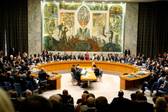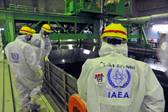Projects
Explore the research programmes and projects undertaken by RUSI's research groups.

This programme focuses on improving effectiveness and impact of preventing and countering terrorism and violent extremism policy and practice.

Our work on chemical and biological threats shines a light on underexplored challenges from unconventional weapons of mass destruction.

This programme aims to better understand the multi-dimensional violent influences that contribute to conflict environments and how to better prevent and counter them.

We analyse the development and application of cyber policy and strategy, cyber as a tool of statecraft and cyberspace as an arena for geopolitical competition.

We focus on understanding and assessing cyber threats from state and non-state actors and evaluate responses and risk management approaches to mitigate them.

We examine nuclear weapons policy, including deterrence, strategic stability, risk reduction, arms control and disarmament.

We examine the impact of disruptive technologies on national security, economic growth and the role of technology in an era of geopolitical competition.

Our evidence-led analysis helps governments, industry, and civil society understand how energy markets, technologies and global supply chains impact national and international security.

This theme focuses on the multifaceted relationship between climate change, environmental and human security, activism, and organised crime.

The European Security in Transformation Programme analyses perennial and emerging security challenges for the wider Euro-Atlantic region within the context of the UK’s national security.

This research programme analyses Russia’s strategic thinking, political change and its global and regional ambitions.

This programme examines the various ways in which communications and communities are exploited, particularly emphasising the misuse of online platforms and new technologies.

We examine the transnational aspects of far-right extremist violence and terrorism, emphasising online interactions, gender roles and the effects on communities.

This programme focuses on the development and implementation of effective anti-financial crime policies and regulation both in the UK and internationally.

This programme covers security in the region that is the global centre of gravity for economic growth, technological development, and geopolitical competition: the Indo-Pacific.

We convene dialogues, host events and deliver briefings to broaden understanding of nuclear issues.

Our work on organised crime and corruption explores the dynamics of illicit markets and the drivers and enablers that sustain them in order to inform effective policy responses.

We focus on enhancing police effectiveness in response to new and complex security threats and social challenges, and measures to improve police accountability. We also specialise in the more specific opportunities and difficulties facing policing in developing countries.

The Profession of Arms programme brings together defence practitioners and policymakers to discuss today’s live defence questions.

This programme focuses on sanctions, economic security, and the financial dimension of state threats.

We examine the fast-evolving security and defence agenda in Latin America and consider the most effective ways to counter the leading threats across the region.

This programme aims to enhance the effectiveness and impact of stabilisation and peacebuilding initiatives while also exploring the advantages of integrated programming methods.

We study the nuclear and missile programmes of Iran and North Korea, and examine policies in support of global non-proliferation regimes.

We seek to understand the role that civil nuclear power plays as an instrument of geopolitics, and how to mitigate potential security and safety risks of its spread.

This programme examines transnational dynamics in the Middle East, North Africa and Turkey within a shifting global order.
Loading results...

